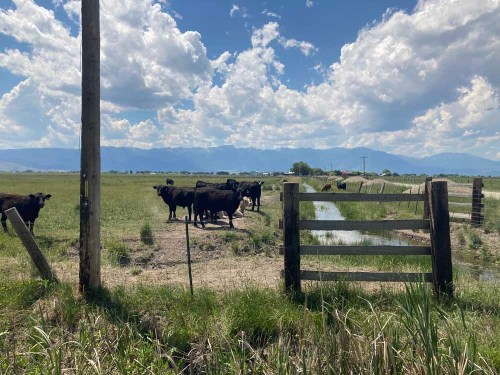Ranchers optimistic about call for antitrust probe into meat packing
Published 2:46 pm Friday, July 2, 2021

- Cattle grazing in a Baker Valley pasture, with the Elkhorn Mountains in the background, in June 2021.
BAKER CITY — Curtis Martin is excited about the momentum he sees, including at the highest levels of the federal government, to address a situation that he contends leaves both cattle ranchers and consumers at the economic mercy of a handful of corporations.
“There’s never been a more golden opportunity than now,” said Martin, a North Powder rancher, member of the Oregon Beef Council and former president of the Oregon Cattlemen’s Association.
Trending
Martin’s enthusiasm derives in part from a recent letter that several members of Congress, including Sen. Ron Wyden, D-Ore., sent to U.S. Attorney General Merrick Garland.
The first paragraph of the letter, dated June 1, summarizes the topic:
“The time has come for the government to determine whether the stranglehold large meatpackers have over the beef processing market violate our antitrust laws and principles of fair competition,” the legislators wrote. “Too much market power often yields less competition and is ripe for market abuse. Yet as you know, four large meatpacking companies control over 80% of the processing market in today’s economy and are seemingly able to control prices at their will, or even defy expectations of market fundamentals.”
Martin, who has been trying for more than a decade to convince federal officials to look into the meatpacking industry, said he lobbied Wyden to sign the letter. Martin said he’s encouraged that lawmakers are pushing for a thorough federal investigation.
“I think it is a significant step because of the stature of the individuals,” he said. “And it’s bipartisan, which is great.”
The lawmakers’ efforts yielded results on July 9, when the Biden administration, as part of a widespread campaign to promote competition across the U.S. economy, directed the U.S. Department of Agriculture to consider issuing new rules under the Packers and Stockyards Act, making it easier for ranchers to bring and win claims.
Trending
Wyden lauded the July 9 announcement.
“Oregon’s family cattle ranchers are essential to keep food on the table of struggling families with fair-priced, high-quality meat at the grocery store,” Wyden said. “I welcome the administration’s work to ensure market competitiveness, transparency and other measures to support Oregon’s family ranchers, and I will continue to fight tooth and nail for them in Congress.”
Martin contends that the four major meatpacking corporations in the U.S. — Tyson, Cargill, JBS and National Beef — dominate the market to the detriment of both ends of the supply chain, with ranchers on one end and consumers at the other.
His favorite metaphor is the hourglass, with the major meatpackers controlling the middle, where everything slows down.
The issue here isn’t speed, though, Martin believes, but that the packing companies are siphoning off a disproportionate share of the profits, leaving ranchers struggling to stay afloat and forcing consumers to pay more for steaks and burgers than they ought to.
“Everyone has to make a profit of course, but it’s just unscrupulous now what’s going on,” Martin said. “If we can break up that chokepoint in the middle.”
In their letter to Attorney General Garland, the members of Congress write that “in the last several years, the price of live cattle in the United States market has plummeted, while the price of boxed beef has significantly increased, raising consumer prices at the grocery store. Concurrently, the major packing companies realized significant profits.”
Martin contends that scenario is a clear violation of antitrust laws.
“We don’t need new laws, we just need the laws we already have to be enforced,” he said. “It’s just criminal what’s going on.”
Although Martin certainly doesn’t want to see a repeat of the economic upheavals that happened early in the COVID-19 pandemic in 2020, he said the situation — and in particular the temporary shortage of retail beef that resulted from virus outbreaks in packing plants — had a “silver lining.”
He believes many consumers, who had come to expect a robust meat selection, were chagrined when they realized the supply system isn’t as reliable as they believed.
“The COVID chaos exposed how fragile our food security system is,” Martin said.
Moreover, he believes the temporary disruption in the supply also caused some consumers to compare retail and live cattle prices — the same issue the lawmakers cited in their letter to Garland.
“There’s a certain percentage of consumers who are more enlightened,” Martin said.
He suspects they’re also more likely to pose questions to their elected representatives — the sort of constituent pressure that potentially contributes to letters such as the one Wyden and the others sent to Garland.
That letter also addresses two other related issues that Martin has also long been advocating for.
The first is the practice of some beef packers of placing “Product of the U.S.A.” on their products even though the cattle were actually raised outside the country.
Martin agrees with Wyden and the other members of Congress who advocate for mandatory country of origin labeling for beef.
“I want my customers to know me, and I want them to know the product they’re receiving is actually a product of the USA,” Martin said.
The second issue gets to the heart of the issue of a small number of companies dominating the meat processing industry.
The letter notes that it’s illegal to sell state-inspected meat nationwide, “forcing local producers to bottleneck their beef processing at major U.S. meatpacking facilities to get the federal stamp of approval.”
Martin supports ongoing efforts to make it possible to process meat in regional or local plants, a move that would both increase competition and give ranchers more options when they sell their cattle.
Bill Moore, who has a cattle ranch in southern Baker County, agrees.
Although Moore said smaller, regional processing plants wouldn’t directly benefit all ranchers — some have large enough herds that they need the capacity of the big plants — he supports efforts to expand the market.
“It’s never a bad idea to have more players,” said Moore, who, like Martin, is a past president of the Oregon Cattlemen’s Association.
Moore said that although he’s not convinced a federal antitrust investigation is warranted, he supports efforts to determine that the market is operating legally.
“I’m an advocate of less government restrictions and free trade, but you need to make sure that all the players are being treated fairly,” Moore said.
Martin said he’s long been convinced that the system is decidedly unfair, and he’s eager to see a federal investigation put hard numbers behind that claim.
The letter that Wyden and the other lawmakers signed doesn’t mince words.
“Unfortunately, the current situation involves multi-national meatpacking companies that continue to get fat off of the high price they impose on retailers and consumers, and the low price they set for producers,” the letter reads. “Our American ranchers work hard every day to produce the best beef in the world. They battle the wind, the rain, the snow and the sun. They shouldn’t have to battle a problem their government has an obligation to fix.”









